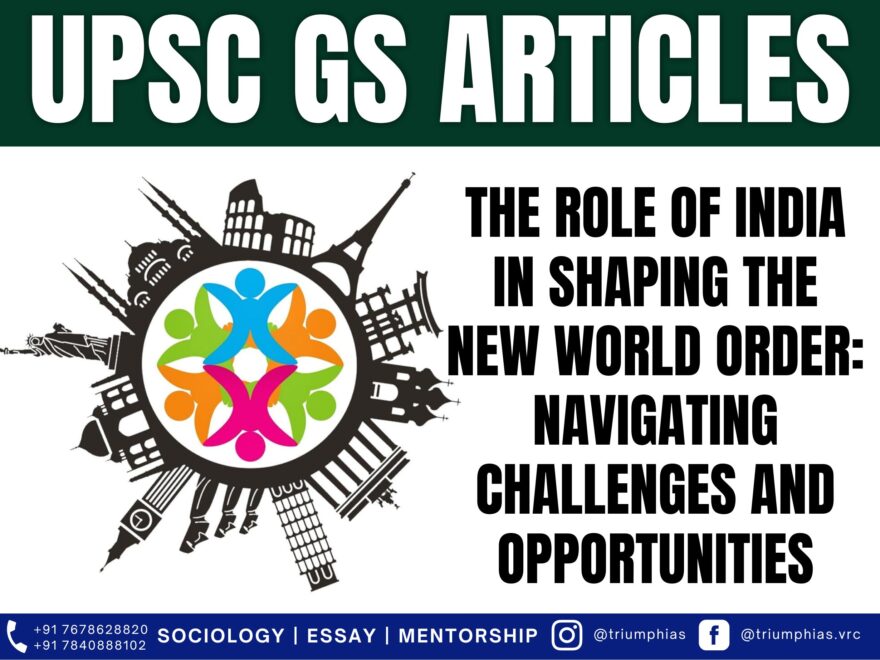Role of India in New World Order
(Relevant for General Studies Paper Prelims/Mains)

Role of India in new world order
It’s evident that Post-Cold War multilateralism, which involves collaborative efforts among numerous nations, has reached a historic low both globally and regionally. This decline is clearly illustrated by the recent East Asia Summit held in Jakarta and the G20 summit in Delhi, which have highlighted the severe and potentially enduring challenges faced by the previous framework of global cooperation.
Post-Cold War multilateralism denotes the era following the conclusion of the Cold War in 1991, during which numerous countries across the globe engaged in diverse forms of cooperation and coordination encompassing areas such as trade, security, human rights, and environmental conservation.
This era was made possible by the absence of major conflicts involving the two superpowers, the United States and the Soviet Union, along with their respective allies. Post-Cold War multilateralism was grounded in liberal principles such as democracy, the rule of law, and open markets, and it found support from institutions like the United Nations, the European Union, the Association of Southeast Asian Nations, and the World Trade Organization.
New world order
The term “the new multilateral world order” signifies the development of fresh modes of collaboration and dialogue involving various nations and regions in the 21st century. This transformation is a response to the demands and opportunities brought about by globalization, climate change, pandemics, terrorism, and other issues that demand collective efforts and cooperative solutions.
Several attributes define the new multilateral world order:
- The broadening and diversification of existing multilateral institutions, such as the UN, IMF, and World Bank, to encompass a more extensive array of voices and viewpoints from the developing world and the Global South.
- The establishment and fortification of novel regional and sub-regional organizations like BRICS, the African Union, the Association of Southeast Asian Nations, and the European Union, all of which are designed to promote regional integration, development, security, and cooperation.
- The emergence of informal networks and initiatives, exemplified by the Alliance for Multilateralism, the G20, and the Quad, that focus on addressing specific issues or challenges that transcend national borders and necessitate synchronized action.
- The acknowledgment of the multipolar nature of the world, where no single nation or bloc can exercise dominance or dictate the global agenda. Instead, various stakeholders must engage in dialogue and negotiation to identify common ground and mutual benefits.
Reasons behind Decline of Existing Multilateralism
The Elevation of China and Its Expansionist Ambitions: A prominent factor contributing to the waning of the established multilateral order is the ascent of China as a global economic and military force. China’s expansionist policies, both within Asia and globally, challenge the existing multilateral structure.
Its independent attempts to modify borders with neighbouring nations and its assertive territorial expansion have generated tensions and destabilized regional and global institutions.
Economic and Security Perils Stemming from China: The economic and security hazards emanating from China have prompted countries like the United States, Japan, and India to reassess their engagement with China. Consequently, there have been endeavours to mitigate the considerable economic interdependence with China, a move that carries implications for existing multilateral economic bodies.
Russian Activities: The Russian occupation and annexation of Ukraine’s Crimea in 2014 presented a notable challenge to the post-Cold War security framework, particularly in Europe. This occurrence disrupted multilateralism by fostering divisions and conflicts within the international community.
Inherent Contradictions of the Multilateral System: The multilateral system itself has grappled with internal contradictions and dilemmas. These internal disparities and competing interests among member states have weakened the effectiveness of multilateral organizations and hindered the formation of consensus.
Emergence of Alternative Security Frameworks: In response to China’s expansionism, alternative security platforms like the Quad, AUKUS, and trilateral agreements have surfaced. These forums signify a shift away from conventional multilateral institutions, raising questions about the ongoing relevance and centrality of existing regional organizations such as ASEAN.
Evolution of Perspectives Among Key Actors: Alterations in the stances of pivotal players, including India, have also played a role in the decline of established multilateralism. India’s evolving perception of the international order, transitioning from concerns regarding a “unipolar Asia” dominated by China to more active engagement with the United States and its allies, have reshaped the dynamics of multilateralism in the Indo-Pacific region.
Global Financial Crisis and Expansion of the G7: The global financial crisis of 2008 emphasized the necessity of enlarging the Group of Seven (G7) to include middle-power nations to reinstate global economic stability. While this represented a positive step toward addressing global challenges, it also underscored the limitations of the existing multilateral framework.
Role of Indian in new world order
- India has the potential to assume a prominent role in various forums, including the Quad and ASEAN, along with other regional and sub-regional platforms. Its primary objective would be to champion an Indo-Pacific region that upholds principles like the rule of law, respect for sovereignty, and peaceful dispute resolution.
- Additionally, India can bolster its collaboration in maritime security with nations that share similar values, aiming to address the challenges emanating from China’s assertive actions in the area.
- India’s contribution to the process of re-globalization can involve diversifying its trade and investment partners, particularly within the Global South. Simultaneously, it can work on bolstering its domestic capabilities across vital sectors such as manufacturing, services, and innovation.
- Advocating for a more democratic and equitable global governance system, which accurately represents the realities and aspirations of emerging economies, is another avenue for India to pursue.
- Taking advantage of its role as host of the G20 summit, India can utilize this platform to showcase its vision and accomplishments as a global leader. It can also strive to build consensus on critical matters such as climate change, sustainable development, health security, and digital transformation.
- Furthermore, India can serve as a bridge between developed and developing nations by shedding light on their shared interests and challenges, while proposing inclusive and practical solutions.
Sample Question for UPSC Sociology Optional Paper:
1. Question: What role can India play in shaping the new multilateral world order?
Answer:
India can champion principles like the rule of law, diversify trade partners, advocate for equitable global governance, and serve as a bridge between developed and developing nations.
2. Question: How has China’s rise impacted the existing multilateral framework?
Answer:
China’s expansionist policies and economic influence have challenged the existing multilateral structure, prompting countries like India to reassess their engagement.
3. Question: What are the key factors behind the decline of post-Cold War multilateralism?
Answer:
China’s rise, Russia’s activities, internal contradictions in multilateral systems, emergence of alternative frameworks, and evolving perspectives of key actors have contributed to the decline.
4. Question: How can India utilize its role as host of the G20 summit?
Answer:
India can use the G20 platform to build consensus on critical issues like climate change, sustainable development, and health security, showcasing its vision and accomplishments as a global leader.
5. Question: Why is regional integration important in the new world order, and how can India contribute?
Answer:
Regional integration promotes development, security, and cooperation. India can engage actively in forums like the Quad and ASEAN to bolster regional integrity and stability.
To master these intricacies and fare well in the Sociology Optional Syllabus, aspiring sociologists might benefit from guidance by the Best Sociology Optional Teacher and participation in the Best Sociology Optional Coaching. These avenues provide comprehensive assistance, ensuring a solid understanding of sociology’s diverse methodologies and techniques.
New World Order, Multilateralism, international relations upsc, international relations upsc books, international relations upsc syllabus, international relations upsc notes, international relations upsc prelims questions
Why Vikash Ranjan’s Classes for Sociology?
Proper guidance and assistance are required to learn the skill of interlinking current happenings with the conventional topics. VIKASH RANJAN SIR at TRIUMPH IAS guides students according to the Recent Trends of UPSC, making him the Best Sociology Teacher for Sociology Optional UPSC.
At Triumph IAS, the Best Sociology Optional Coaching platform, we not only provide the best study material and applied classes for Sociology for IAS but also conduct regular assignments and class tests to assess candidates’ writing skills and understanding of the subject.
Choose The Best Sociology Optional Teacher for IAS Preparation?
At the beginning of the journey for Civil Services Examination preparation, many students face a pivotal decision – selecting their optional subject. Questions such as “which optional subject is the best?” and “which optional subject is the most scoring?” frequently come to mind. Choosing the right optional subject, like choosing the best sociology optional teacher, is a subjective yet vital step that requires a thoughtful decision based on facts. A misstep in this crucial decision can indeed prove disastrous.
Ever since the exam pattern was revamped in 2013, the UPSC has eliminated the need for a second optional subject. Now, candidates have to choose only one optional subject for the UPSC Mains, which has two papers of 250 marks each. One of the compelling choices for many has been the sociology optional. However, it’s strongly advised to decide on your optional subject for mains well ahead of time to get sufficient time to complete the syllabus. After all, most students score similarly in General Studies Papers; it’s the score in the optional subject & essay that contributes significantly to the final selection.
“A sound strategy does not rely solely on the popular
Opinion of toppers or famous YouTubers cum teachers.”
It requires understanding one’s ability, interest, and the relevance of the subject, not just for the exam but also for life in general. Hence, when selecting the best sociology teacher, one must consider the usefulness of sociology optional coaching in General Studies, Essay, and Personality Test.
The choice of the optional subject should be based on objective criteria, such as the nature, scope, and size of the syllabus, uniformity and stability in the question pattern, relevance of the syllabic content in daily life in society, and the availability of study material and guidance. For example, choosing the best sociology optional coaching can ensure access to top-quality study materials and experienced teachers. Always remember, the approach of the UPSC optional subject differs from your academic studies of subjects. Therefore, before settling for sociology optional, you need to analyze the syllabus, previous years’ pattern, subject requirements (be it ideal, visionary, numerical, conceptual theoretical), and your comfort level with the subject.
This decision marks a critical point in your UPSC – CSE journey, potentially determining your success in a career in IAS/Civil Services. Therefore, it’s crucial to choose wisely, whether it’s the optional subject or the best sociology optional teacher. Always base your decision on accurate facts, and never let your emotional biases guide your choices. After all, the search for the best sociology optional coaching is about finding the perfect fit for your unique academic needs and aspirations.
To master these intricacies and fare well in the Sociology Optional Syllabus, aspiring sociologists might benefit from guidance by the Best Sociology Optional Teacher and participation in the Best Sociology Optional Coaching. These avenues provide comprehensive assistance, ensuring a solid understanding of sociology’s diverse methodologies and techniques. Sociology, Social theory, Best Sociology Optional Teacher, Best Sociology Optional Coaching, Sociology Optional Syllabus.
Best Sociology Optional Teacher, Sociology Syllabus, Sociology Optional, Sociology Optional Coaching, Best Sociology Optional Coaching, Best Sociology Teacher, Sociology Course, Sociology Teacher, Sociology Foundation, Sociology Foundation Course, Sociology Optional UPSC, Sociology for IAS,
Follow us :
🔎 https://www.instagram.com/triumphias
🔎https://www.youtube.com/c/TriumphIAS
https://t.me/VikashRanjanSociology
Find More Blogs
|
Scope of the subject and comparison with other social sciences |
|||
|
|
|
|
Modernity and social changes in Europe |


One comment